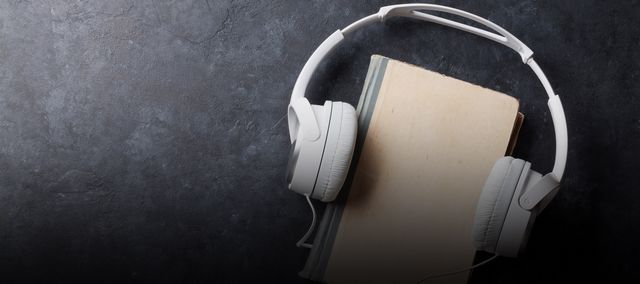4 April 2018
Particularly since the extraordinary success of the U.S. podcast “Serial”, subscribable audio series from the internet have also boomed in Germany. Techies in particular will find a lot to discover in the world of podcasts. #explore now presents a few of the most exciting.
“Forever a niche” was the title of an article in the German news magazine Spiegel Online which was published in summer 2014. It speculated about why podcasts, i.e. audio items that are published online via so-called RSS feeds, are not nearly as popular as pussy cat videos - even a decade after they were invented. But reality has now caught up, for even though sweet kitty videos still get astronomical numbers of clicks, the success of American podcast formats like “Serial” has also set off a podcast wave in Germany which for two years now seems to have been rising instead of falling. And no wonder: independently of the programme schedule and established formats in traditional radio, podcasts give the producers more time for in-depth conversations, and also room to experiment. Listeners can receive these online audios easily on their smartphones – anywhere and at any time when their eyes and hands are needed for something else like jogging, driving or doing the dishes.
Even the established media outlets have long since discovered podcasts as a market. All major national German newspapers and magazines, such as Süddeutsche Zeitung, DIE ZEIT or Spiegel-Online, also bring out their own audios. Public service radio stations such as Deutschlandfunk and Deutschlandfunk Kultur have been putting their audios on the net as podcasts for years, and since autumn 2017 they have started to produce exclusive political and cultural podcasts online which are no longer broadcast on the radio at all. And even the well-known streaming services count on the popularity of the podcast.
Never has the offer of podcasts been wider or more diverse: nowadays, there is something for everyone and every time span, from three-hour talk shows to multi-chapter series, in-depth interviews and five-minute morsels of information for entertainment on a short tram ride. For techies in particular, the world of podcasts is full of treasures. However, not everyone has time to go digging for gold on the net, so the editors of #explore are featuring interesting tech podcasts in a two-piece series.
The classic: Chaos radio
The German Chaos Computer Club is one of the best-known and famous associations of hackers; they have been advocating freedom of information and a “new human right to world-wide, unhindered communication” ever since the club was established. In this spirit, since 1995 the CCC hackers have been broadcasting their chaos radio over the ether and online together with the Berlin radio station Fritz. In more than 240 episodes, the expert and experienced members of the association discuss gaps in security systems, operating systems, cyber culture, data protection and cyber politics. Their agenda also contains items such as botnets, computational life sciences, incident response or the spyware used by German law-enforcement agencies for online surveillance – in other words the methods used by the CCC’s cyber security rescue forces to help companies rebuff or mitigate the effect of hacker attacks.
Link to the podcast: https://blog.chaosradio.ccc.de/
Tracing the bug: System error
Bugs, viruses and computer crashes are an annoying but all too familiar part of our daily digital life. In his podcast “Systemfehler” (system error), Christian Conradi has an interesting way of looking at defects, errors and other spanners in the works: Why are computer errors named after insects? How does a botnet work? Do smartphones really have an inherent expiry date? Can computers compose music that is indistinguishable from a work by a human? What consequences does the space debris of satellites have for the Earth? Where does spam come from and who are the people who send it? These are the questions which the trained radio journalist and co-founder of the podcast label Viertausendhertz (four thousand Hertz) answers in elaborately produced pieces - narrated in a relaxed tone of voice. And if you are interested in podcasts, you might also like to listen to some productions by his colleagues. In his Elementarfragen (elementary questions) Nicolas Semak holds in-depth discussions with interesting figures from the world of politics, culture and society. His guests include the communard Rainer Langhans, murder investigator Rainer Petermann, astronomer Harald Lesch, and even the blogger Sascha Lobo and well-known cyber political activist Markus Beckedahl.
Link to the podcast: http://viertausendhertz.de/systemfehler/
Netflix for your ears: Cyber crime
“When will we finally have Serial in German?” – a series of podcasts which keeps millions of people awake at night, because they can’t sleep without listening to the next episode. The broadcaster HR-Inforadio is offering a first alternative with their “Cybercrime” series: exciting as a thriller, based on real cases and months of research, the nine episodes of the series provide highly interesting insights into the shady realm of cybercrime and hackers, with investigators and IT emergency experts giving a first-hand account of their work. A cybercrime investigator chasing a child abuser on the internet, a DAX-listed corporation battling digital espionage, a criminal hacker speaking about her methods and motivation – three riveting and real stories come together to form a complex image of an unknown world with its own laws and rules. And so – if you want to “just listen to one more episode” before going to sleep, you had better have time to sleep in the next morning.
Link to the podcast: http://www.hr-inforadio.de/podcast/cybercrime/index.html
The gadget freak: C‘t Uplink
A podcast from Nerdistan: this description of the computer magazine podcast as seen by its originators is extremely fitting. In a relaxed setting and with more than 200 episodes to their name, the technical editors chat about drones, displays, robot vacuum cleaners, Bluetooth keyboards and bio hacking. Apart from discussing day-to-day tech business, they also explain safety loopholes like Meltdown and Spectre, demystify tech myths and talk about artificial intelligence or the end of the smartphone. For those who enjoy moving pictures, the podcast is also available as a video – showing the editors as they are flying drones or using Bluetooth headphones and VR goggles.
Link to the podcast: https://www.heise.de/ct/entdecken/
Long stories short: Charger
Since mid-2017, in the eight episodes of their podcast Netzteil (charger) to date, the internet editors of Spiegel-Online have been looking into self-driving cars, fake news, cybersex, voice assistants and the future of gaming. The podcast is hosted by Teresa Sickert, who also presents internet-related topics on Deutschlandfunk Kultur and Radio Fritz. At a comparatively short 20 minutes, the podcast is a good introduction to each of the topics and fits perfectly into the average daily train commute. Teresa asks the questions we have all been wanting to ask ourselves and her trained radio voice makes sure it’s a pleasure to listen to her while she does it.
Link to the podcast: http://www.spiegel.de/thema/netzteil_podcast/
The cartographers of digital change: Pathways to digitisation
A little more digital every day: Digitisation is turning companies and their business models upside down in record time. But which pathways actually lead into an interconnected future, and what are the risks and opportunities associated with digitisation? These are the questions which are considered in the podcast “Wege der Digitalisierung” (pathways to digitisation). The software developer Nils Löwe speaks with start-up founders, IT managers and social media experts about how they handle digital transformation in and with their companies. Thorsten Römer from the Hamburg museum for archaeology talks about how museums and their visitors can benefit from digital technologies, whilst Ulf Theike, expert for digitisation at TÜV NORD, explains the challenges related to interconnected factories and smart toys.
Link to the podcast: https://wegederdigitalisierung.de/
The gaming historians: Stay Forever
“A podcast about old games by two old men” – this is the self-mocking phrase used by the makers of “Stay Forever” to open every episode of their podcast about vintage computer games. Gunnar Lott and Christian Schmidt are at most middle aged, but are rich in experience when it comes to (old) computer games which they – as the leading editors of renowned gaming magazines like Gamestar – have collected over time. And it is plain to hear: if you grew up in the 80s and 90s playing games like “Sim City”, “Lemmings”, “The Settlers” or “Monkey Island”, you will feel teleported back into your childhood. But for Gunnar and Christian, nostalgia is not enough. Based on years of experience in the gaming industry, extensive research and clear analysis, the two computer game historians reconstruct the creation of gaming classics as well as the development and early days of the young medium itself. And their listeners appreciate it, paying the two podcasters a monthly salary of approximately 11,000 U.S. dollars via the crowdfunding platform Patreon.
Link to the podcast: http://www.stayforever.de/
Electric cars, autonomous driving, astronaut training, pumped-storage hydro power plants and artificial intelligence: In the second part of our series, we will present podcasts about mobility and science.
You may also like
GOOD TO KNOW
How to get a podcast: Many podcasts can be played on platforms like iTunes, Spotify and Deezer or subscribed via their apps. In the case of iTunes, Apple users already have a pre-installed podcast app on their smartphone or tablet. Users of Android devices can subscribe to their daily dose of internet audio via podcast apps such as Podcast & Radio Addict, BeyondPod, AntennaPod or Podcatcher. New podcasts are then downloaded automatically.


